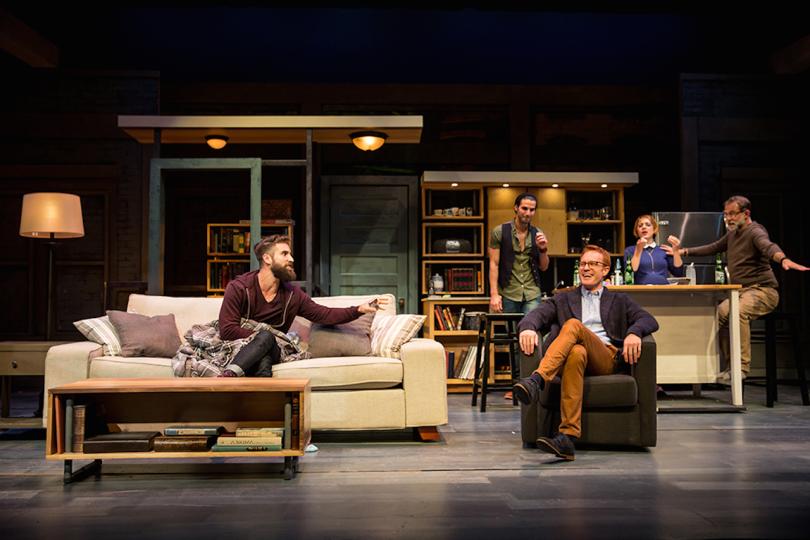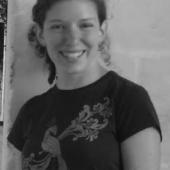The conventional rom-com, with a twist

At age 35, David is a sworn bachelor. His relationships never last more than four months, and he is content to live in a comfortable routine as a professor of library science. But David’s life gets turned upside down during a wild bachelor party weekend in Montreal, when he meets a young, free-spirited florist who teaches him the true meaning of love and commitment…
Sounds like the latest rom com, right? Does it change anything to know that David’s life-changing 23-year-old Francophone manic pixie dream girl is, in fact, a man?
Your answer to that question cuts to the heart of Le Switch, a new play by Philip Dawkins at the Jungle Theater. Le Switch is, in almost every possible way, a standard romantic comedy, including the rom com’s traditional emphasis on marriage as one of the crowning achievements of adulthood. (Pregnancy would be the other one – and despite the protagonists’ being gay men, there is a pregnancy in here too.)
But what makes Le Switch interesting is that behind these fairly predictable conclusions is a question that doesn’t yet feel resolved: now that gay marriage is legal – and, at least in the Twin Cities, normalized enough so we don’t really bat an eyelash at a gay romantic comedy – what happens to the “queerness” of gay identity? For those who spent their lives fighting for recognition and acceptance, who do they become now that the fight is over?
OK, hold up. I know what you’re thinking. The fight is absolutely not over. The characters in Le Switch sort of acknowledge that – there’s a nod to brutal anti-gay policies in Africa – but they don’t really seem to worry about issues on a domestic level, so let me make the required political digression into just a few of the things that these characters could be caring about, as members of a queer community:
Discriminatory anti-transgender bathroom policies. LGBT individuals being targets of both individual and mass acts of violence. Bullying, whether physical or verbal, of LGBT and gender non-conforming students in schools, including their ability to take whomever they want to school events like prom.
Right. So, in rom com world, we legalized gay marriage and now everything’s cool. In the real world, we’re not there yet. But Le Switch still feels relevant because its characters, which include gay men in their 50s, 30s, and 20s, each grew up in dramatically different political climates that shaped their experiences of being gay in different and interesting ways.
For instance, maybe you’re more like Benoît, who grew up in a French-Canadian community where his coming-out experience at age 14 was met with, “So, does he want a sandwich?” In that case, maybe you’re not all that impressed by Le Switch’s depiction of male romance. But if you relate more to Frank, who, in his late 50s, spent most of his life getting arrested at gay rights demonstrations, then a play like this might feel like the ultimate victory (or, depending on your relationship to pop culture, the ultimate act of selling out).
These questions of perspective are what this production tackles particularly well, and what makes it more interesting than your average (gay) chick flick. The set, by Kate Sutton-Johnson, mirrors this concept oddly well (and very efficiently), with furniture and shelving units that quickly stand in for mountains and walls that rotate out to expose broad expanses of sky. What you see on stage really does depend on how you look at it.
For me, Patrick Bailey was the highlight of the show as Frank. He has a beautiful emotional range, both grieving for a loved one and providing wry comic relief in the face of David’s commitment-phobia. But the whole ensemble was strong. After recently seeing him as the intensely masculine Aufidius in Coriolanus, I loved Michael Wieser’s performance as David’s ultra-effeminate best friend Zachary. And Michael Hanna – who has also been doing a lot of good work recently, both in Dracula and Bad Jews – was very sweet as Benoît, despite some confusing stabs at French pronunciation (his French-accented English was spot on, though).
As in most romantic comedies, the main character, David, was the most predictable. But Kasey Mahaffy imbues him with a back story, with parents, siblings, and politics, that take him further than your average protagonist who just hates love because they’ve been burned one too many times. Maybe because of that, I found his relationship with his twin sister Sarah (played by Emily Gunyou Halaas) to be more fully fleshed-out, and thus more interesting, than his immediate attraction to Benoît.
There are things to object to about Le Switch, both in its adherence to well-worn tropes and its sense that the struggle for gay rights is winding down. But in spite of those things (and my general resistance to the genre), I enjoyed it a lot.
Philip Dawkins’ script is witty and well-performed, particularly as the characters get established in the first act. And the gay community is underrepresented in the media, and they have a right to cheesy romances too – particularly ones that also acknowledge that while marriage may be the foregone rom com conclusion, it is a choice and a right that was not accessible for many until recently, and not without generations of struggle.




